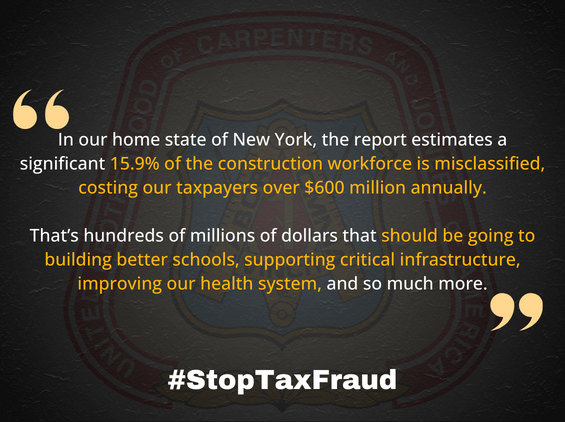A strong union needs skills, benefits and ACTION!

January 22, 2023 | Crain’s New York Business
Charlene Obernauer, the executive director of The New York Committee for Occupational Safety and Health, Joseph Geiger, the executive secretary-treasurer of New York City District Council of Carpenters, and Joseph Byrne, the executive secretary-treasurer at North Atlantic States Regional Council of Carpenters, wrote an op-ed for Crain’s New York Business arguing that construction worker misclassification harms us all.
~
The construction industry grapples with a pervasive issue: misclassification. This is a practice used by unscrupulous employers that not only showcases a reprehensible disregard for labor laws but also poses a serious threat to the overall well-being of workers.
Misclassification takes place when companies deliberately mislabel workers as independent contractors instead of employees, allowing unethical employers to skirt payroll taxes and evade employment responsibilities. Not only does this cheat workers, but it also has significant ramifications on law-abiding businesses, taxpayers and the broader economy.
Recent research from the Century Foundation finds that an estimated 1.1 million to 2.1 million construction workers nationwide were either misclassified or received off-the-books payments. This staggering figure accounts for up to 19% of the entire construction industry workforce, translating to an estimated annual cost to taxpayers of up to $10 billion as employers avoid paying into Social Security, unemployment insurance and workers’ compensation.
In our home state of New York, the report estimates a significant 15.9% of the construction workforce is misclassified, costing our taxpayers over $600 million annually. That’s hundreds of millions of dollars that should be going to building better schools, supporting critical infrastructure, improving our health system, and so much more.
This exploitative practice also has severe consequences for the labor market. Workers are unjustly deprived of the employment benefits to which they are entitled while businesses that uphold ethical standards find themselves at a disadvantage, thus shrinking the market of good jobs.
The true extent of misclassification remains largely obscured because a considerable portion happens within an underground economy. Employers engage in cash-only, off-the-books deals making it exceedingly difficult to identify and address the issue.
Misclassification isn’t a standalone problem but part of a systemic issue that demands holistic solutions. Enforcement plays a pivotal role. In New York State, all employers who intentionally misclassify employees are subject to penalties, taxes and restitution.
But enforcement alone is not enough. Solving misclassification requires a 360-degree approach from city, state and federal officials to stand up for workers’ rights and hold employers accountable. That includes cracking down on wage theft, supporting legislation like the Protecting the Right to Organize Act, and ensuring that all workers, even if they are classified as contractors, are protected.
Prevailing wage laws, such as New York’s Fair Share Act, also play a crucial role. Though not directly addressing misclassification, prevailing wage is a cornerstone in the fight for workers’ rights and fair pay. The Fair Share Act, for instance, mandates that construction workers on publicly subsidized projects receive a standard wage and benefits, ensuring all workers are paid what they deserve and discouraging misclassification by raising the stakes for non-compliance. Furthermore, the act would require certified payrolls – meaning that employers must provide weekly reports to prove they pay their workers the prevailing wage – further deterring misclassification and wage theft.
Upholding legislation that unapologetically stands up for workers’ rights, such as prevailing wage laws, is critical. In 2024, our fight against misclassification must persist. Let’s stand tall, fight for justice, and ensure workers get what’s rightfully theirs. The future beckons — a future where we hold accountable those who exploit, champion the cause of hard-working New Yorkers, and create a fair and just playing field for all.